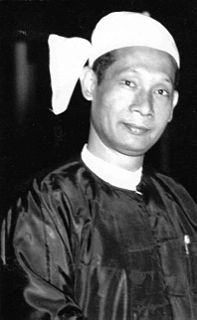 |
|---|
| This article is part of a series on the politics and government of Myanmar |
|
|
The Patriotic Alliance was a political alliance in Burma.
 |
|---|
| This article is part of a series on the politics and government of Myanmar |
|
|
The Patriotic Alliance was a political alliance in Burma.
The Patriotic Alliance was formed in the 1950s in order to oppose the ruling Anti-Fascist People's Freedom League (AFPFL) by prominent pre-war politicians including Ba Maw and U Ba Pe. [1] Prior to the 1951–52 general elections it joined the People's Democratic Front (PDF) alliance alongside the Burma Workers and Peasants Party and the Burma Democratic Party. [2] The PDF won 19 of the 250 seats in the Chamber of Deputies, emerging as the main opposition to the AFPFL, which had won 199 seats.
In the 1955 municipal elections in Rangoon the Patriotic Alliance received 29% of the vote, but won only one of the 35 seats. [1] The alliance was disbanded by the time of the 1956 general elections, with most of its factions joining the National United Front. [1]

The Anti-Fascist People's Freedom League, was the main political alliance in Burma from 1945 until 1958. It was founded by the Communist Party of Burma (CPB) led by Thakin Soe, the Burma National Army (BNA) led by Aung San, and the People's Revolutionary Party (PRP) at a meeting held between 1–3 March 1945 as a reorganised version of the Anti-Fascist Organisation (AFO), formed to resist the Japanese occupation. The new organisation aimed to resist the Japanese occupation and achieve independence.

Ba Swe was the second Premier of Burma. He was a leading Burmese politician during the decade after the country gained its independence from Britain in 1948. He held the position of prime minister from 12 June 1956 to 28 February 1957. When Ba Swe became prime minister, Time magazine reported the news in an article titled: 'The Day of the Tiger' based on his nickname 'Big Tiger' since his university days in the 1930s as a student leader.

The Burma Muslim Congress (BMC) was a Muslim political party in Burma.

The Burma Workers Party, until 1958 the Burma Workers and Peasants Party, was a communist party in Burma, formed on 8 December 1950 by leftist elements of the Socialist Party. In December 1962 it merged with the People's Comrade Party to form the United Workers Party. In March 1964, it was among the many parties banned by decree of the Revolutionary Council.
Thakin Lwin was a Burmese politician and trade unionist, writer and journalist. He was a leading member of the anti-colonial Dobama Asiayone movement, a parliamentarian, the president of the Trade Union Congress (Burma) and a prominent leader of the Burma Workers and Peasants Party.

The National United Front was a political alliance in Burma.

General elections were held in Burma on 6 February 1960 to install a government to take over from General Ne Win's interim administration, established in October 1958. The military-led administration was credited for bringing stability and improving infrastructure in the country, though it suppressed some civil liberties.

General elections were held in Burma to vote for 202 out of 250 seats to the Burmese Chamber of Deputies; the remaining 48 members ) were elected unopposed as no opposition candidates stood against them.

General elections were held in Burma over several months between June 1951 and April 1952 due to internal conflict within the country.

General elections were held in Burma on 9 April 1947 to form the basis of a constituent assembly that would design a constitution once independence from the United Kingdom had been achieved. They were the first elections in Burma since its separation from India under the British Raj. Voter turnout was 49.8%. However, Aung San was assassinated three months later, resulting in U Nu becoming the first Prime Minister of Burma.

The Kachin National Congress was a political party in Burma.

The Burma Democratic Party was a political party in Burma.

The communist insurgency in Myanmar was a conflict fought primarily by the Communist Party of Burma and the Communist Party (Burma) from 1948 to 1988. The conflict ended when the armed wing of the Communist Party of Burma disbanded following the Fall of Communism and the ousting of the Burmese socialist dictatorship.

The People's Democratic Front (PDF) was a political alliance in Burma.

The People's Educational and Cultural Development Organisation was a political party in Burma.

The People's Peace Front was a political party in Burma.

The United Hill People's Congress was a political party in Burma.

The Union Party was the ruling political party in Burma in the late 1950s and early 1960s. Formed by a split in the Anti-Fascist People's Freedom League, it was initially known as the Clean AFPFL.

The Stable AFPFL was a political party in Burma.